In my review last week of
Diana Butler Bass’ important new book, Christianity After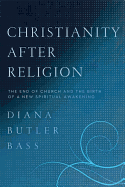 Religion: The End of Church and the Birth of a New Spiritual Awakening (HarperOne; $24.95) I noted that some readers and reviewers
Religion: The End of Church and the Birth of a New Spiritual Awakening (HarperOne; $24.95) I noted that some readers and reviewers
have already been pretty critical, both of her ecumenical/liberal
theological bias and her conviction that a spiritual awakening is a-brewing, one that
may take new forms of renewal and reformation that are not necessarily grounded
in the traditional, institutional churches as we know them. She gets push-back when she speaks—I
have been little part of that push-back myself, asking questions of her during a lecture
a few months back, wanting to clarify if she is too hard on those whose commitment to orthodoxy may make them less than fully eager to embrace new formulations of doctrine, or who may seem less than fully inclusive in their outreach. I know
there are huge anxieties these days whenever we criticize traditional theology
or comfortable forms of congregational life and her pleasant demeanor and good stories are helpful, even though some church folks are always edgy when talking about change. We here have lost customers because we have admitted to being
eager to read and discuss and ponder and pray about (just for instance) the
emergent conversation, and because I’m not wanting to throw emergent friends (or conservative friends, or liberal friends) under the proverbial bus. I know this is complex and scary business and it sometimes brings out our worst.
(For what
it is worth, I wrote a long piece in 2008 sharing why I was interested
in that evolving “emergent” movement. I
should update it, I suppose, but I am frankly a bit less interested in their
splintered light then I used to be.)
I believe it is no small thing to drift away from historic orthodoxy,
and I hope those who study Diana’s book are not cavalier about throwing
out the old and embracing the new, as if anything old is necessarily outdated and everything new is naturally good and helpful. Diana doesn’t believe that sort of silliness and I don’t think any serious author would want
such a knee-jerk, superficial response; we ought not misread the careful, studious,
valuable work presented in Christianity After Religion. Some who have read it, or heard her lecture about it, have found it immensely helpful in
drawing a portrait of the religious landscape as we move into the second decade
of the new century. Still, some are rather grumpy about it.
I start with this unhappy
reminder of the sometimes unpleasant responses to provocative books and
authors, especially given our current context of culture wars, ideological use of religion and prevalent mistrust
of those outside of our customary faith traditions in order to be able to say
this: Beth and I had a fabulously upbeat time this past weekend hanging around in one of the
more diverse theological gatherings we’ve had the joy of being a part of. The conference was called Fresh Expressions and was convened to explore new forms of missional outreach and congregational
efforts—the question Butler Bass is asking, really—and nobody seemed to be uptight about anything. We had Southern Baptists and
charismatic Anglicans, mainline (ECLA) Lutherans and Church of the Nazarene, old-school Episcopalians and some pretty conservative Evangelical Free folk, singing Indian-influenced praise songs together in urdu (yes, you read that right!) A Presbyterian Church (USA) prof lectured
on contemporary theology (and Karl Barth!) while Christian Missionary and Alliance leaders listened appreciatively. Non-denominational
church planters—old school and hipsters alike–listened to Graham Cray, a
commissioned Bishop of the Church of England, as he walked us through a Church of England document from a working group he chaired. We had a Calvinist ask if we had Armenian resources and a
United Methodist guy was surprised to see a batch of new Abingdon Press
titles. A Baptist who had never heard of Henri Nouwen or Parker Palmer picked up some of those authors. A male pastor of an historic black church and a (white) female oil painter did a workshop together describing their arts ministry with inner city kids. One of the speakers wrote a book on British versions of what we call the “new monastics” movement, so there was interest in that a bit, too. Yep, this was truly a
diverse gathering—left, right, and center within Protestantism, at least (oh,
if there only there were some Roman Catholic or Eastern Orthodox folk there.) We were so blessed not to
have folks snooping around the book display sniffing for something they
disagreed with, but searching for new insights, fresh ideas, faithful
ruminations to help equip and inspire them to get on with our high callings of imaging God in effective
ways in our needy world. It did
our souls good to be with these folks—-three cheers for the Virginia
Baptists—and thanks to all who bought a bunch of books.
Fresh Expressions (U.K.), we
came to realize, is a huge deal in the Church of England, a movement of
encouragement to manifest fresh expressions of the church among unreached
populations, from secularized youth in coffee shops to blue collar iron workers
in the mill towns, from the eager-to-be-welcomed new immigrant communities to
those languishing in retirement homes or prisons. Wherever our traditional parishes are failing to reach folks, fresh
expressions of church can be authorized and new (Holy Spirited) energies
unleashed. Because this is a
British thing, it didn’t surprise us to see Episcopalians and new Anglicans
there. The U.S. version of Fresh Expressions is
largely funded by Baptists, who have a good history of outreach, evangelism and
new church planting. To see
Presbyterians and Pentecostals (and, thanks be to God, a few Pentecostal
Presbyterians, even) at this Fresh Expressions event was a delight.
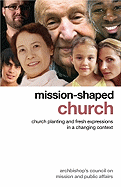 For those interested of the working group on fresh expressions, a group chaired by our plenary speaker Bishop Graham Cray, you should know that he edited a book all about this (a book we sold out of at the conference) called Mission Shaped Church (Seabury; $20.00) It is part of a series, actually, but this first is the one that describes the Fresh Expressions movement within the Church of England and it is recommended especially for more mainline denominations. Cray is a wonderful man and, incidentally, ran the famous GreenBelt Festival for many years. We chatted about mutual friends like Calvin Seerveld and Bill Romanowski and Jim Wallis and Brian Walsh, not to mention some sweet stories about Bono and the band and the times Bruce Cockburn played at GreenBelt. But I digress…
For those interested of the working group on fresh expressions, a group chaired by our plenary speaker Bishop Graham Cray, you should know that he edited a book all about this (a book we sold out of at the conference) called Mission Shaped Church (Seabury; $20.00) It is part of a series, actually, but this first is the one that describes the Fresh Expressions movement within the Church of England and it is recommended especially for more mainline denominations. Cray is a wonderful man and, incidentally, ran the famous GreenBelt Festival for many years. We chatted about mutual friends like Calvin Seerveld and Bill Romanowski and Jim Wallis and Brian Walsh, not to mention some sweet stories about Bono and the band and the times Bruce Cockburn played at GreenBelt. But I digress…
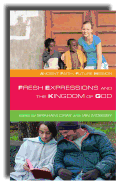 We are taking pre-orders, by the way, for a forthcoming book by Bishop Cray, enticingly called Fresh Expressions and the Kingdom of God: Ancient Faith Future Mission It will be published near the end of June by Canterbury Press ($24.95)
We are taking pre-orders, by the way, for a forthcoming book by Bishop Cray, enticingly called Fresh Expressions and the Kingdom of God: Ancient Faith Future Mission It will be published near the end of June by Canterbury Press ($24.95)
Parenthetically, not all the
books we took were about missional outreach and new forms of congregational
life construed to touch the lives of the “nones” (as Butler Bass tells us they
are being called, as in those that say “none” on religious surveys.) In fact, there is a sense that besides emerging new expressions of church, for some people, historic, older styles of church and worship will remain important and viable. Duh.
For fabulous examples of how serious thinkers
these days are considering and reconsidering their denominational loyalties, often deepening their explorations of older liturgical traditions,
see the brand new book (expertly edited by a Southern Baptist, at that) called Journeys of Faith: Evangelicalism, Eastern Orthodoxy,
Catholicism, and Anglicanism edited by Robert Plummer. (Zondervan; $18.99.) Chapters are by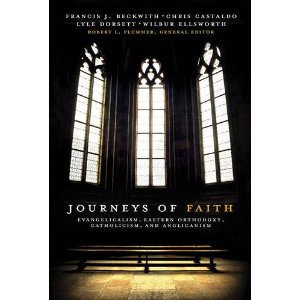 Francis Beckwith, Chris
Francis Beckwith, Chris
Castaldo, Lyle Dorsett and Wilbur Ellsworth where each tell their story of how
they have found a spiritual home within these historic traditions, traditions in which they did not originally belong. After each chapter there are
responses from the others, so you can read, for instance, a Catholic response
to evangelicalism or an evangelical reply to Anglicanism, or an
Orthodox reply to the others. The
whole journey begins with a nice foreword by Scot McKnight. As Moody Bible prof Bryan Litfin notes,
“If you have ever wondered, ‘Why in the world would someone become that type of
Christian?’ this book provides the answer.”
Fresh Expressions wasn’t convened to debate theology as this
book does, and yet, as we consider
new forms and expressions of parish ministry, creative outreaches and provisional church plants, we must continue to think through
these large doctrinal questions about our largest divisions and the nature of the apostolic faith handed down. Kudos to Zondervan for releasing it.
The FreshX event had a very well-curated art display (thanks to the Washington Arts Group) and was a bit
multi-ethnic, too and we all appreciated those intentional efforts. There were women in leadership, too—what a joy to finally
meet Jo Saxton, for instance, who has worked with our friends at Catalyst and Q
in recent years, and whose new book More Than Enchanting: Breaking Through
Breaking Through
Barriers to Influence Your World (IVP; $15.00) is a wonderful example of missional
vision and Kingdom perspective for purpose-driven women. (Jo is the director of 3DM which “helps
train leaders for discipleship and mission in an increasingly post-Christian
culture.”) What an exciting
presenter, bringing stories of her native UK and her current setting in
California. I meant it when I told
the audience that this book, while it is written to inspire women in missional
leadership, it is good for anyone. In fact, I think it is important for leaders who are male to read this book, learning what obstacles are sometimes before our sisters in Christ.
Here is a talk Jo Saxton gave at the Q Ideas conference a few years ago. Check it out and order the book from us, asap! She is a dynamo!
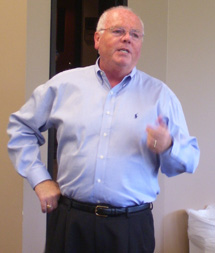 What a delight it was to
What a delight it was to
hear Reggie McNeal. We have sold McNeal’s books over the years, and we
stock all the books from the Leadership Network Publication line that he helps
oversee. I think the first of his
I read was his book on the spirituality of leadership, A Work of Heart:
Understanding How God Shapes Spiritual Leaders (Jossey Bass; $24.95) which is a study of the life of
David that has been recently reissued in a revised second edition. You should know that he has taken much of his learnings from being a coach and mentor to pastors and other leaders and published Practicing Greatness: 7 Disciplines of Extraordinary Spiritual Leaders (Jossey Bass; $24.95.) We even have his 4 DVD set The Present Future: Six Tough Questions for the Church (Jossey Bass; $149.00.) I knew he was important, but had no idea he was so funny. And passionate about the church getting involved in ways that help solve problems of poverty. Thank goodness.
So, you’ve got to read some Reggie McNeal. His Missional Renaissance: Changing the Scorecard for the Church (Jossey-Bass;
$24.95) is widely considered his most important and we highly recommend it.
Missional Renaissance has been promoted in our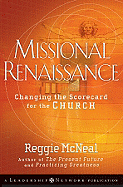 own
own
Presbytery, even, illustrating that it is vital for mainline
congregations as well as the energetic new church developers. It invites us to
measure and celebrate other things (he was powerfully clear about this—we go
after than which our metrics measure, so if more members, better numbers,
bigger offerings is what we report on, we’ll see that as some “end all.” What would it look like, he teaches us
to wonder, to find ways, rubrics and rhetoric and habits of
conversations—re-languaging, he called it—that promoted God’s work in the
world, the fidelity of folk in the marketplace and neighborhood, the
social flourishing breaking out through the Spirit’s work, here and there? If disciples are called to be salt and light and leaven, how to we honor and celebrate that? Can that be on our “missional scorecard?”
Of Missional Renaissance,
Victor Pentz of Peachtree Presbyterian writes, “If you are a pastor or church
leader ready to get down to the raw specifics of turning a Christendom club
into a missional community, you will love this book. The concepts are easily understood as they are radical and
breathtaking. There are a number of brilliant missional theorists, but no one
can speak the language of our American context and put the rubber on the street
like Reggie McNeal.”
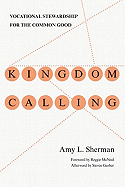 In my book announcement time I was
In my book announcement time I was
trying to illustrate this idea of attending to God’s work in the world (not just within the walls of the church) by pushing the must-read Work Matters: Connecting Sunday Worship to Monday Work by Tom Nelson (Crossway; $15.99) and the visionary, multi-layered missional work Kingdom Calling: Vocational Stewardship for the Common Good by Amy
Sherman (IVP; $16.99.) Ha — I forgot that Reggie McNeal, in fact, wrote the very positive preface to Kingdom
Calling. (My friend Steve Garber, by the way, wrote the afterword.) Not enough churches talk
about–let alone measure and testify about and celebrate successes of marketplace
ministry—so I was happy to bring that contribution to the FreshEx
gathering. And glad that Reggie
affirmed it as he took in my energetic book recommendations.
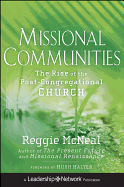 McNeal’s latest book,
McNeal’s latest book,
Missional Communities: The Rise of the Post-Congregational Church, (Jossey-Bass; $24.95) is an
evangelical and practical work that would be excellent to read on the heels of
the new Diana Butler Bass. Rather than fret much
about the post-Christian culture or await some ill-defined awakening, he
invites us to get involved now in what these Brits and Baptists are calling fresh
expressions of church. He calls it
“post-congregational” and is picking up on the work of guys like Neil Cole, who wrote Organic Church: Growing Faith Where Life Happens (Jossey Bass; $24.95) and like the insightful The Tangible Kingdom: Creating Incarnational Community: The Posture and Practices of Ancient Church Now by Hugh Halter (Jossey Bass; $23.95.) These are all practical resources helping congregations ponder and apply missional principles, reconsidering their very nature, the way they do ministry, and how to form communities on the move, reaching out and making disciples.
People sometimes ask me
where to begin, or what to read next, in this on-going missional movement. The one’s listed above are excellent to start with.
For what it is worth, though, the seminal 1998 book
which was the first to use the phrase in print, is Missional Church: A Vision of the Sending Church in North America edited by
Princeton Seminary prof Darell Guder (Eerdmans; $29.00) who was at Fresh Expressions, too. It seems to me that this idea of being
missional—being a church that realizes we are not to be civil religious
chaplains to the status quo, but view post-Christian North American as a mission
field to which we must contextualize our own discipleship and outreach–came
from this important conversation, drawing largely on the missionary insights of
Lesslie Newbigin. His The Gospel in a Pluralist Society (Eerdmans; $24.00) is a true classic, a bit slow-going, but
important and worthy of repeated, careful readings. His earlier and briefer Foolishness to the Greeks: The Gospel and Western Culture (Eerdmans; $16.00) is a bit more
readable and I think more important. The Gospel and Our Culture
Network, by the way, was a co-sponsored of the FreshEx conference. They are, as they say, spot on. Anyway, Guder channeling Newbigin, is one of the
grand-daddies of the movement, and we’ve stocked their books since they first came out.
Here are a few more
recent must-reads if you want to get up to speed with these missional
conversations. There are so many,
and many are good. This is the
essential short list.
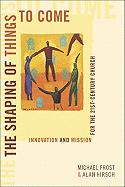 The Shaping of Things to
The Shaping of Things to
Come: Innovation and Missions for the 21st Century Church Michael
Frost & Alan Hirsch (Hendrickson) $19.99 As early
articulation of cultural exegesis, looking at secularization, the rejection of
Christendom, the need for a wholistic Kingdom vision and all the rest. This is
one of the most often-cited works in this field, perhaps the most important
missional book to read. I can’t say enough about it. This is the book that put these guys on the map, and set the stage for a whole new generation of very astute cultural critics and whole-life discipleship visions, contextualized for our brave new world.
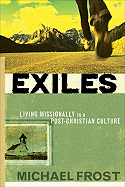 Exiles: Living Missionally in a Post-Christian Culture Michael Frost (Hendrickson) $19.99 I’m very fond of this, maybe because of its
Exiles: Living Missionally in a Post-Christian Culture Michael Frost (Hendrickson) $19.99 I’m very fond of this, maybe because of its
radical social critique. Again, this reminds us of the dysfunction of a “churchy” view of faith, and affirms the spirituality of the ordinary, the importance of the Kingdom themes, the way we are called to resist ideologies in the culture. Shades of
Brueggeman and Willimon, drawing on the themes of the Hebrew prophets during
the time of the Babylonian captivity.
Wow. This will get your motors running!
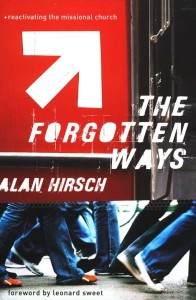 The Forgotten Ways: Reactivating the Missional Church Alan Hirsch (Brazos Press) $19.99 Okay, this is
The Forgotten Ways: Reactivating the Missional Church Alan Hirsch (Brazos Press) $19.99 Okay, this is
it. A must read. Period. You can’t be fluent in this conversation without knowing about Hirsch, and this is the first one to read of his.
The Forgotten Ways
Handbook: A Practical Guide for Developing Missional Churches Alan Hirsch (Brazos Press) $13.99 I
sometimes am a bit cynical when a publisher does a companion book or workbook like this. Is this really necessary or just milking the thing a bit more? Well, thanks to Brazos for offering this—it is a guidebook for congregational use that is very helpful and highly
recommended. Get your church pals
reading this, sooner than later.
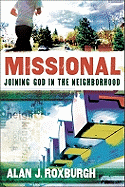 Missional: Joining God in the
Missional: Joining God in the
Neighborhood Alan Roxburgh (Baker) $16.99
Not sure why, but this is very popular, I think because it is so very
clear about local outreach, about caring enough to be creative in reaching out. It is one I often tell people to start with. All the reviewers insist this is Roxburgh’s best, and any of his are great. This explains the shift to an
“outwardly focused” church as well as anything in a reasonably sized paperback. David Fitch, says, “It is sure to be a tour de force for the missional conversation. I am not being excessive when I say this book is brilliant.”
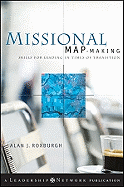 Missional Map-Making: Skills
Missional Map-Making: Skills
for Leading in Times of Transition
Alan Roxburgh (Jossey Bass) $24.95
Others have used the map metaphor before, how the maps we have and use
themselves shape our journeys.
What if the cityscape has changed?
What if we are using outdated and consequently inadequate maps? This is one of the most interesting, creative
and generative resources for big thinking leaders that I know of.
Craig Van Gelder (professor of congregational mission at Luther
Seminary) notes “Roxburgh continues to move the missional conversation
forward! His Missional Map-Making
creatively builds on his previous publications offering critical perspective on
how to navigate the overwhelming complexity of today’s world. This important book
provides insightful historical perspective toward clarifying the contours of
our present landscape, while also being deeply instructive for helping
reflective and courageous Christians develop skills for creating new maps
toward participating more faithfully in God’s mission.” That’s a mouthful. Read it again, and tell me that this
doesn’t sound exciting and fruitful?
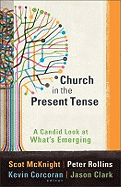 Church in the Present
Church in the Present
Tense: A Candid Look at What’s Emerging book + DVD Scot McKnight, Peter Rollins, Kevin Corcoran, Jason Clark (Brazos Press) $21.99 This book is less about the missional
movement as discussed by McNeal, Roxburgh, Hirsch, Frost, Guder, et al. It really is a roundtable discussion
about the state of the emergent conversation. There are rave reviews by John Franke (theologian in
residence at First Presbyterian Church of Allentown, PA), David Fitch (North
Park Seminary) and Tony Jones of Solomon’s Porch—one of the clearest (that is, most funky) examples of the
emergent way of being church these days, and they all recommend it as exceptional. Phyllis Tickle
(author of The Great Emergence) writes “This is the most complete, detailed, critically
sympathetic, and totally remarkable overview I have yet seen of where Emergence
Christianity presently is and appears to be going. McKnight’s two essays alone
are worth the price of admission.” The DVD is fun and comes with the book making this a fabulous bargain for those who want to listen in to this provocative convo. A bit heady at times, as you might imagine…Corcoran, who mostly put it together, is a philosphy professor at Calvin College in Grand Rapids, MI.
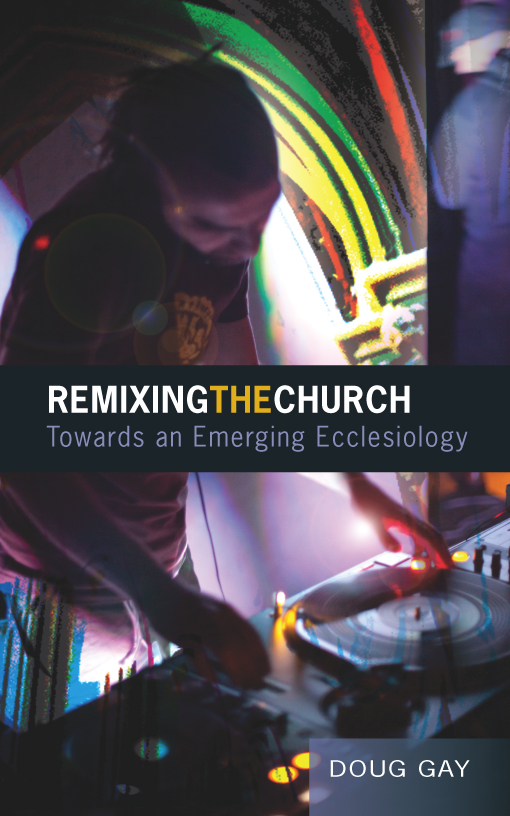 Remixing the Church:
Remixing the Church:
Towards an Emerging Ecclesiology
Doug Gay (SCM) $30.00 Yeah,
it is pricey, even for an import, but this is a huge (too often missing) piece of the emergent, missional, (and now, Fresh Expressions)
conversations. Graham Cray, the
Church of England leader of the Fresh Expressions team (and missioner appointed
by the Archbishop) spoke about this at the conference and as an Anglican he has
certain important sensibilities about sacraments and ordination and
ecclesiology, or at least I assumed he did. He was surprisingly less
anxious about this than I was, and I was glad for a helpful, if brief conversation with
him. At what point does an organic outreach, forming a discipleship community, become a church? What is an expression of The Church? What is a missional, Kingdom eccesiology? I still love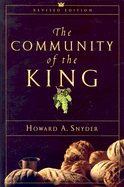 Howard Synder’s Community of the King (revised and expanded) (IVP; $18.00) and often say it is my favorite book on the nature of the church. Also a favorite is a more recent book by Tim Chester—I sometimes called it “gospel centered church”—titled Total Church: A Radical Reshaping Around Gospel and Community (Crossway; $15.99. ) I do think it is important to revisit this regularly and this new one by Gay is good.
Howard Synder’s Community of the King (revised and expanded) (IVP; $18.00) and often say it is my favorite book on the nature of the church. Also a favorite is a more recent book by Tim Chester—I sometimes called it “gospel centered church”—titled Total Church: A Radical Reshaping Around Gospel and Community (Crossway; $15.99. ) I do think it is important to revisit this regularly and this new one by Gay is good.
I’ve helped start and
have spoken at dozens and dozens of para-church fellowship groups over the
years, but have routinely reminded them that their coffee-shop Bible study or
Bread for the World citizens lobby group or college ministry fellowship are not
real churches; I am very grateful that unlike some para-church campus ministries, the CCO has written into their goals a hope for partnerships with local congregations, insisting that college kids should not view their campus fellowship group as a substitute for an established parish church. I still have a fairly traditional set of assumptions—the maps
that inform my worldview—about real church and para-church, I guess. The esteemed Bishop Cray
invited us to lighten up a bit, since any and all congregations, no matter how
formal, sound, large or well-established, are only but “expressions” of the
full Body of Christ, after all. “Wherever two
or three are gathered” he reminded us…and called for risky experiments of outreach, hopes for new nests, new start-up projects, fresh expressions, disciple-making, worshiping bodies.
And so, it shouldn’t have
surprised me to see Bishop Cray’s rave commendation on Remixing the Church, and his affirmation of this study. He writes, “We owe Douglas Gay a debt
of thanks. Through this book he
has made it possible to continue a conversation about the emerging state of the
church…with courtesy and humility.
This is a gift from Scotland about the catholicity of the church.”
Jonny Baker (whose latest book published by Seabury offers a new way to think about worship and worship leading
is interestingly called Curating Worship [$20.00]) writes of Douglas Gay’s Remixing… “I was very moved by this book. It’s a creative, mature piece of
practical theology that maps contours of the emerging church movement over the
last few decades and offers reflections on ecclesial practice into the future.
Doug’s passion for a generous and humble ecumenism is inspired and much
needed. I am so thankful he has
written it and so identify with the sensibilities and themes.” I’ve followed Baker’s work since his
days as a student at Toronto’s Institute for Christian Studies, and am glad for
his input on this.
I liked the phrase “ecclesial practice.” It reminded me a bit of Desiring the Kingdom: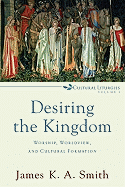 Worship, Worldview, and Christian Formation by James K.A. Smith (Baker Academic; $21.99), a book I wish I would have sold at Fresh Expressions since it is about how we need thick and rich liturgies and other “ecclesial practices” to counter the shaping influences of the secular litanies that so inform the habits of our hearts. If we are going to offer fresh expressions by doing edgy little church plants and forming house churches or communities of discipleship, what is it about those communities that will truly transform us? A great love for Jesus and desire to serve Him well a radically transformative body does not make, I’m afraid. Hmm.
Worship, Worldview, and Christian Formation by James K.A. Smith (Baker Academic; $21.99), a book I wish I would have sold at Fresh Expressions since it is about how we need thick and rich liturgies and other “ecclesial practices” to counter the shaping influences of the secular litanies that so inform the habits of our hearts. If we are going to offer fresh expressions by doing edgy little church plants and forming house churches or communities of discipleship, what is it about those communities that will truly transform us? A great love for Jesus and desire to serve Him well a radically transformative body does not make, I’m afraid. Hmm.
Well, such a
phrase takes us back to Diana Butler Bass’ new book and Reggie McNeal’s latest one. Listen carefully to the titles and subtitles. Christianity After Religion: The End of Church and the Birth of a New Spiritual Awakening and Missional Communities: The Rise of the Post-Congregational Church. What might congregations look like in a
time of “Christianity after religion?” Will we be “post-congregational?” It is no wonder those of us loyal to denominational churches and their sturdy status quo are a bit shaken by these questions…
Well, here is one more. It is truly a gift from God, a wonderful little book that I am very eager to chat about. I hope you consider it, and read the various short pieces reflectively, talking about them as you listen to the pain and hope they represent.
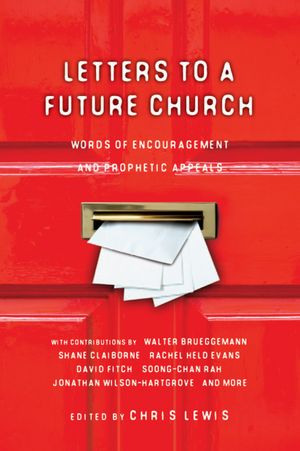 Letters to a Future
Letters to a Future
Church: Words of Encouragement and Prophetic Appeals edited by Chris Lewis (IVP) $15.00 This is creatively written, exceptionally passionate, and
diverse in orientation. I promoted
it at the Fresh Expressions event and wish I had more time to explain it
better. Lewis is the cofounder of
the Epiphaneia Network, yet another movement to equip and inspire Jesus
followers in Kingdom ministry, this one focused mostly on Canadian
Christians. This intriguing book
came out of one of their projects, the “Eighth Letter Conference” which, as you
might guess, invited leaders old and young to offer pastoral letters to the
church. Exiled on the island of
Patmos, the apostle John was commanded to write about
what he saw and heard and to record and send messages to seven churches. (Get it — these are the “eighth letters.”) What might the Spirit say to our North
American churches today? There is
a fabulous opening piece by Andy Crouch the bears several good readings, and then there are short letters by Canadian evangelical leader Aileen
Van Ginkle, Soong-Chan Rah, Peter Rollins, Makoto Fujimura, Ron Sider and
more. Imaginative notes are
offered by Walter Brueggemann, Shane Claiborne, Tim Challies, Rachel Held
Evans, David Fitch, Jonathan Wilson-Hartgrove, Janell Anema, Kathy Escobar.
There are four main
sections, grouping the epistles around mission, truth, art, and hope. There are some playful letters from a girl’s diary offered as interludes, and plenty to ponder as these folks draft their manifesto-like letters, appealing to the church, sometimes with whimsy, sometimes through tears…
The final appendix “Letters to a Future Church from the
End of a Millennium” include short pieces by older leaders, aimed at certain sorts of churches. We hear briefly from John Ortberg,
William Willimon, Gardner Taylor and Eugene Peterson. (Is this the first time IVP has published the legendary
black preacher, Gardner Taylor?
Wow!) These are rich and thoughtful, little works of writerly art. They read well out loud and I think you could use them in many settings.
Reading Letters to a Future Church is a good way into this conversation, listening well to these creative pleas which
describe our contemporary setting so well, inviting us to reconsider what, really,
the mission of God is, and how we can best embody and create signposts pointing
the way of restoration promised by the resurrected Lord. Hearing these folks offer their letters, their hearts, their pleas, will touch your own heart, and perhaps compel you to further seek how to be an agent of conversation in your own congregation, raising the urgent questions of change, outreach, mission, and the nature of “Christianity after religion.” More than ever, now, I want to use my little book-selling slogan: Read for the Kingdom! These books will help us think through some of the most basic things of the Christian life, the very nature of our churches and their work.
ADDENDUM: Just saw this cover story in The Christian Century that discusses church planting. It mentions Pittsburgh Theological Seminary’s Scott Sundquist, a quote well worth reading. And Darrell Guder, and other good folks.
BookNotes

SPECIALDISCOUNTany book mentioned
2O% off
order heretakes you to the secure Hearts & Minds order form pagejust tell us what you want
inquire here
if you have questions or need more information
just ask us what you want to know
Hearts & Minds 234 East Main Street Dallastown, PA 17313 717-246-3333
 The Province of Joy: Praying with Flannery O’Connor Angela Alaimo O’Donnell (Paraclete Press) $16.99 Well, what to say? The book feels nice, has lovely French flaps making it is a higher quality paperback. There is a peacock on the cover which, as you know if your an O’Connor fan, is significant. Flannery O’Connor (1925-1941) was a rugged Catholic novelist and short story writer in the deep South whose bent tales helped us see grace in, well, in just about everything.
The Province of Joy: Praying with Flannery O’Connor Angela Alaimo O’Donnell (Paraclete Press) $16.99 Well, what to say? The book feels nice, has lovely French flaps making it is a higher quality paperback. There is a peacock on the cover which, as you know if your an O’Connor fan, is significant. Flannery O’Connor (1925-1941) was a rugged Catholic novelist and short story writer in the deep South whose bent tales helped us see grace in, well, in just about everything. Song of a Scientist: The Harmony of a God-Soaked Creation Calvin B. DeWitt (Foreword by Bill McKibben) (Square Inch Books) $14.99 I love Cal DeWitt. I loved his great Bible study Earthwise, out now in a nice updated edition from Faith Alive. I loved that he was an early Christian leader in creation- care and co-founded the EEN (Evangelical Environmental Network.) I like that he spoke at the IAM arts conference in New York city last year. I like that this square sized small paperback is on the newish “Square Inch” imprint, which, you should know, is an allusion to that famous line of Abraham Kuyper about Christ presiding over “every square inch” of creation. I love that environmental activist and remarkably skilled Methodist nature writer Bill McKibben wrote the forward to this Reformed, evangelical book. I like that the blurbs on the back are from Richard Rohr (a Roman Catholic spirituality writer) and C. Rene Padilla (an evangelical theologian from Latin American with a keen sense of social justice, a man who has been in our store, and who I could hardly esteem more highly.) I love all this, and I’ve not even started to tell you about the book itself. I can only tell you, this is the real deal, a wonderful little package for an author who deserves to be taken very seriously. DeWitt is professor of environmental studies at the University of Wisconsin-Madison, and the director emeritus of the Au Sable Institute. Many of us have eager been awaiting a new book by him for a decade or so. Song of a Scientist is it! It shows, as Rene Padilla puts it, “the harmony between God’s creation and God’s salvation.” Spirituality, science, Reformed theology, the work of a researcher and professor? Of course! This beautifully written book—yes, I’ve dipped in a bit already—quotes Aldo Leopold, J.S. Bach, John Calvin, John Muir, Rachel Carson, John Douglas Hall, Wendell Berry, and a ton of Bible passages. It is both about his work as an environmental scientist, and, more generally, about this wonderful vision of being a scholar, a scientist investigating a “God-soaked” creation. This paperback is a serious delight, important, and yet beautifully done and readily accessible to any interested reader. Highly recommended.
Song of a Scientist: The Harmony of a God-Soaked Creation Calvin B. DeWitt (Foreword by Bill McKibben) (Square Inch Books) $14.99 I love Cal DeWitt. I loved his great Bible study Earthwise, out now in a nice updated edition from Faith Alive. I loved that he was an early Christian leader in creation- care and co-founded the EEN (Evangelical Environmental Network.) I like that he spoke at the IAM arts conference in New York city last year. I like that this square sized small paperback is on the newish “Square Inch” imprint, which, you should know, is an allusion to that famous line of Abraham Kuyper about Christ presiding over “every square inch” of creation. I love that environmental activist and remarkably skilled Methodist nature writer Bill McKibben wrote the forward to this Reformed, evangelical book. I like that the blurbs on the back are from Richard Rohr (a Roman Catholic spirituality writer) and C. Rene Padilla (an evangelical theologian from Latin American with a keen sense of social justice, a man who has been in our store, and who I could hardly esteem more highly.) I love all this, and I’ve not even started to tell you about the book itself. I can only tell you, this is the real deal, a wonderful little package for an author who deserves to be taken very seriously. DeWitt is professor of environmental studies at the University of Wisconsin-Madison, and the director emeritus of the Au Sable Institute. Many of us have eager been awaiting a new book by him for a decade or so. Song of a Scientist is it! It shows, as Rene Padilla puts it, “the harmony between God’s creation and God’s salvation.” Spirituality, science, Reformed theology, the work of a researcher and professor? Of course! This beautifully written book—yes, I’ve dipped in a bit already—quotes Aldo Leopold, J.S. Bach, John Calvin, John Muir, Rachel Carson, John Douglas Hall, Wendell Berry, and a ton of Bible passages. It is both about his work as an environmental scientist, and, more generally, about this wonderful vision of being a scholar, a scientist investigating a “God-soaked” creation. This paperback is a serious delight, important, and yet beautifully done and readily accessible to any interested reader. Highly recommended.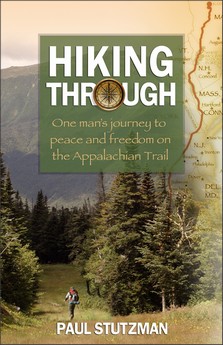 Hiking Through: One Man’s Journey to Peace and Freedom on the Appalachian Trail Paul Stutzman (Revell) $13.99 Nature writing, adventure story, life-changing journey, Christian testimonial, struggle to overcome obstacles both physical and internal, recovery from great grief…this is a book that may have something for nearly everyone. But it is custom-made for those who like the story of a challenge, the call to pursue a dream, a human interest story about growth and redemption. If you know anyone who has done the AT (or other similarly extensive wilderness hikes) you know the thrill of accomplishment, the goof-ball people (and critters) you met along the way (just read Bill Bryson!) the ups and downs of making it in the great outdoors. This book tells of God’s presence and power as this backpacker makes his odyssey Northward. Plainly written, with humor and good observation, this will be a perfect gift for somebody you know; it seems like the sort of thing that will truly touch folks. I look forward to checking it out, maybe later this summer with a day pack. I ain’t going the 2,176 miles through fourteen states. Just sayin. You can check out Paul Stutzman’s own Hiking Through website, here.
Hiking Through: One Man’s Journey to Peace and Freedom on the Appalachian Trail Paul Stutzman (Revell) $13.99 Nature writing, adventure story, life-changing journey, Christian testimonial, struggle to overcome obstacles both physical and internal, recovery from great grief…this is a book that may have something for nearly everyone. But it is custom-made for those who like the story of a challenge, the call to pursue a dream, a human interest story about growth and redemption. If you know anyone who has done the AT (or other similarly extensive wilderness hikes) you know the thrill of accomplishment, the goof-ball people (and critters) you met along the way (just read Bill Bryson!) the ups and downs of making it in the great outdoors. This book tells of God’s presence and power as this backpacker makes his odyssey Northward. Plainly written, with humor and good observation, this will be a perfect gift for somebody you know; it seems like the sort of thing that will truly touch folks. I look forward to checking it out, maybe later this summer with a day pack. I ain’t going the 2,176 miles through fourteen states. Just sayin. You can check out Paul Stutzman’s own Hiking Through website, here.

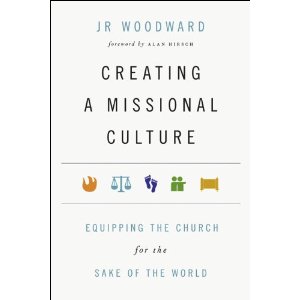 Equipping the Church for the Sake of the World will be by J.R. Woodward (IVP; $16.00) and we it will be great. This will be a serious book—although the author is as cool as can be, a surfer-type dude living in Southern California who reads widely and hangs out with tons of interesting, artsy types—and it may be almost one-of-a-kind (a claim I don’t make often.) It is about new models of shared leadership for the contemporary church, ways to organize our organic life as a worshiping community that will allow for shared energy, shared vision, and shared authority for getting the missional work done. I am not kidding when I suggest that this will be intellectually stimulating, much-debated, and, I think, very, very important. We’ll have it as soon as it releases in early September 2012. You can say you first heard about it here.
Equipping the Church for the Sake of the World will be by J.R. Woodward (IVP; $16.00) and we it will be great. This will be a serious book—although the author is as cool as can be, a surfer-type dude living in Southern California who reads widely and hangs out with tons of interesting, artsy types—and it may be almost one-of-a-kind (a claim I don’t make often.) It is about new models of shared leadership for the contemporary church, ways to organize our organic life as a worshiping community that will allow for shared energy, shared vision, and shared authority for getting the missional work done. I am not kidding when I suggest that this will be intellectually stimulating, much-debated, and, I think, very, very important. We’ll have it as soon as it releases in early September 2012. You can say you first heard about it here. 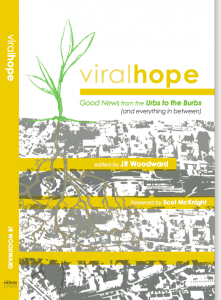 Urbs to the Burbs (and everything in between) (Ekklesia Network; $14.95.) In a nutshell, the book is a collection of pieces that were published in local newspapers, op-ed columns that shared a particular churches dream for their community. The question is at once arresting and interesting, a playful way to rethink your mission statement: what do you imagine to be the contribution you bring to help human flourishing in your town? In other words, what is good about the good news, for this particular place? Almost all of these short essays are worthy of small group conversation, inspiring ways to think through whether this vision or that hope or this dream or that call might be your own. Is this way to articulate the great news that is the gospel really helpful? If not, why not? Do you resonate with this particular congregation’s vision for their outreach? How they explained the good news? Is their hope a faithful expression of God’s dream, and if so, might you, too, embrace that vision for your own town? It isn’t prescriptive though, which is what makes it so useful–it invites prophetic and hopeful imagination, invites you to name your own sense of vocation in the world, asking how the gospel and the culture of your place interact. What you would say, if asked to put something the public paper, what you offer, how you understand your Christian witness? And can you say it in ways that are coherent and interesting for the watching world? How do you describe the gospel, what good news your church brings? What ways do the gifts and passions and strengths of your own faith community bring some particularity to the evangelon? I love this little book, was glad that a number of the contributors in it were at Fresh Expressions, and happy to have a few left to sell to you. (Some of the authors, by the way, include J.R. Briggs, Jim Belcher, Christine Sine, Jon Tyson, Jamie Arpin-Ricci, Sonja Andrews, Winn Collier, and many more. The foreword is by Scot McKnight and the afterward is by a new friend, Chris Backert, of Fresh Expressions!) Order a bunch of Viral Hope for your small group or elders or leadership council at your church. I think it is pretty nifty.
Urbs to the Burbs (and everything in between) (Ekklesia Network; $14.95.) In a nutshell, the book is a collection of pieces that were published in local newspapers, op-ed columns that shared a particular churches dream for their community. The question is at once arresting and interesting, a playful way to rethink your mission statement: what do you imagine to be the contribution you bring to help human flourishing in your town? In other words, what is good about the good news, for this particular place? Almost all of these short essays are worthy of small group conversation, inspiring ways to think through whether this vision or that hope or this dream or that call might be your own. Is this way to articulate the great news that is the gospel really helpful? If not, why not? Do you resonate with this particular congregation’s vision for their outreach? How they explained the good news? Is their hope a faithful expression of God’s dream, and if so, might you, too, embrace that vision for your own town? It isn’t prescriptive though, which is what makes it so useful–it invites prophetic and hopeful imagination, invites you to name your own sense of vocation in the world, asking how the gospel and the culture of your place interact. What you would say, if asked to put something the public paper, what you offer, how you understand your Christian witness? And can you say it in ways that are coherent and interesting for the watching world? How do you describe the gospel, what good news your church brings? What ways do the gifts and passions and strengths of your own faith community bring some particularity to the evangelon? I love this little book, was glad that a number of the contributors in it were at Fresh Expressions, and happy to have a few left to sell to you. (Some of the authors, by the way, include J.R. Briggs, Jim Belcher, Christine Sine, Jon Tyson, Jamie Arpin-Ricci, Sonja Andrews, Winn Collier, and many more. The foreword is by Scot McKnight and the afterward is by a new friend, Chris Backert, of Fresh Expressions!) Order a bunch of Viral Hope for your small group or elders or leadership council at your church. I think it is pretty nifty.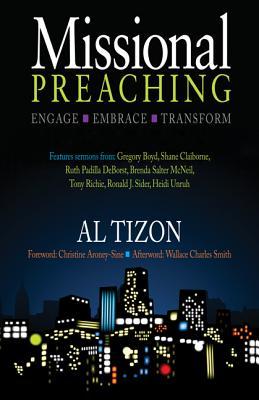 Missional Preaching: Engage, Embrace, Transform Al Tizon, and others (Judson Press) $16.99 Al Tizon is, quite simply, an amazing man, a fine Christian leader, an upbeat and solid leader. He did his PhD in this whole area of “wholistic” ministry and now is Associate Professor of Holistic Ministry at Palmer Theological Seminary (formerly Eastern Baptist Seminar.) He is the Director of the Word & Deed Network of one of our favorite organizations, Evangelicals for Social Action (ESA) founded by Ron Sider. Tizon is an ordained minister of the Evangelical Covenant Church. And, he is a great thinker, a great writer, and a great preacher. So he is perfectly suited to create this important book.
Missional Preaching: Engage, Embrace, Transform Al Tizon, and others (Judson Press) $16.99 Al Tizon is, quite simply, an amazing man, a fine Christian leader, an upbeat and solid leader. He did his PhD in this whole area of “wholistic” ministry and now is Associate Professor of Holistic Ministry at Palmer Theological Seminary (formerly Eastern Baptist Seminar.) He is the Director of the Word & Deed Network of one of our favorite organizations, Evangelicals for Social Action (ESA) founded by Ron Sider. Tizon is an ordained minister of the Evangelical Covenant Church. And, he is a great thinker, a great writer, and a great preacher. So he is perfectly suited to create this important book.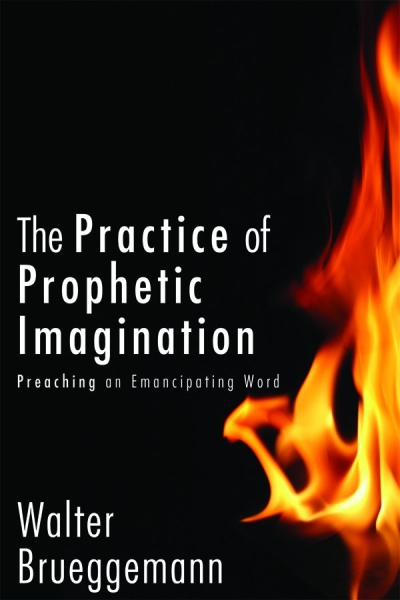 The Practice of Prophetic Imagination: Preaching an Emancipating Word Walter Brueggemann (Fortress) $25.00 For years, Brueggemann has given us collections of sermons, and several books about homiletics. And, for years, he has been asked to do a sequel to his most famous book, the breath-taking The Prophetic Imagination. This new hardback is, in a manner of speaking, a sequel to The Prophetic Imagination, in the guise of how to proclaim and enhance and nurture and celebrate it. John Buchanan is a renowned mainline Presbyterian who notes that this shows “a wise sensitivity to the realities of the church and an effort to make common cause with those of us who presume to stand in pulpits on Sunday morning and say something faithful.” Well, yeah, it is and it does. And it does that by offering a view of preaching as “sustained, disciplined, emancipated, imagination.”
The Practice of Prophetic Imagination: Preaching an Emancipating Word Walter Brueggemann (Fortress) $25.00 For years, Brueggemann has given us collections of sermons, and several books about homiletics. And, for years, he has been asked to do a sequel to his most famous book, the breath-taking The Prophetic Imagination. This new hardback is, in a manner of speaking, a sequel to The Prophetic Imagination, in the guise of how to proclaim and enhance and nurture and celebrate it. John Buchanan is a renowned mainline Presbyterian who notes that this shows “a wise sensitivity to the realities of the church and an effort to make common cause with those of us who presume to stand in pulpits on Sunday morning and say something faithful.” Well, yeah, it is and it does. And it does that by offering a view of preaching as “sustained, disciplined, emancipated, imagination.”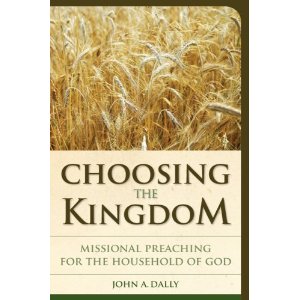 Choosing the Kingdom: Missional Preaching for the Household of God John Addison Dally (Alban Institute) $17.00 This provocative work is part of the “Vital Worship, Healthy Congregations” series co-published by the Calvin Institute of Christian Worship. Here, Dally–a professor at Seabury-Western in Evanston–wonders what preaching looks like “as a post-Christian church reorients itself toward the mission of God.” The back cover puts it with punch: “Do we speak as bureaucrats in an imperial hierarchy or as servants of the reign of God? Is the announcement of the gospel a demand for submission or an invitation to wisdom?” It gets practical, though, too, even offering ideas about sermon preparation. As Lucy Lind Hogan of Wesley Seminary says, as she raves about it, “preachers are sent not to perform, but to proclaim; not to inform but to invite. Before we undertake our exegesis and investigations, preachers must understand what it means to be those who are sent to proclaim the reign of God.” Thought-provoking, offering both pretty serious theology and “how-to” guidance for rethinking not only the content but the form of preaching.
Choosing the Kingdom: Missional Preaching for the Household of God John Addison Dally (Alban Institute) $17.00 This provocative work is part of the “Vital Worship, Healthy Congregations” series co-published by the Calvin Institute of Christian Worship. Here, Dally–a professor at Seabury-Western in Evanston–wonders what preaching looks like “as a post-Christian church reorients itself toward the mission of God.” The back cover puts it with punch: “Do we speak as bureaucrats in an imperial hierarchy or as servants of the reign of God? Is the announcement of the gospel a demand for submission or an invitation to wisdom?” It gets practical, though, too, even offering ideas about sermon preparation. As Lucy Lind Hogan of Wesley Seminary says, as she raves about it, “preachers are sent not to perform, but to proclaim; not to inform but to invite. Before we undertake our exegesis and investigations, preachers must understand what it means to be those who are sent to proclaim the reign of God.” Thought-provoking, offering both pretty serious theology and “how-to” guidance for rethinking not only the content but the form of preaching.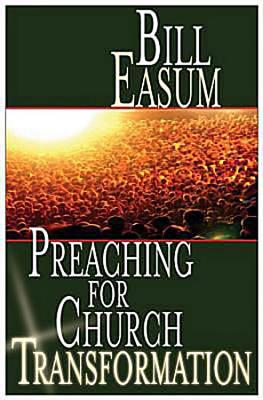 Preaching for Church Transformation Bill Easum (Abingdon) $13.00 Easum has been a church consultant for decades now, it seems, and is serious about change, sometimes pushy, with books that are full of energy and hope and insistence that the typical church can raise the bar on outreach and growth. One may not need to apply all his ideas about congregational revitalization to appreciate that he has seen a lot of different kind of churches and is really experienced in this sort of work. I was struck by Reggie McNeal’s big endorsement on the back, indicating he has long wanted a simple book that will help pastors figure out how to fast-forward their missional engagement with the community. “Preaching for Church Transformation is for those of you who have something to say every seven days, and want that ‘something’ to help your congregation be the church God intended — partnering with Him in his redemptive mission in the world.”
Preaching for Church Transformation Bill Easum (Abingdon) $13.00 Easum has been a church consultant for decades now, it seems, and is serious about change, sometimes pushy, with books that are full of energy and hope and insistence that the typical church can raise the bar on outreach and growth. One may not need to apply all his ideas about congregational revitalization to appreciate that he has seen a lot of different kind of churches and is really experienced in this sort of work. I was struck by Reggie McNeal’s big endorsement on the back, indicating he has long wanted a simple book that will help pastors figure out how to fast-forward their missional engagement with the community. “Preaching for Church Transformation is for those of you who have something to say every seven days, and want that ‘something’ to help your congregation be the church God intended — partnering with Him in his redemptive mission in the world.”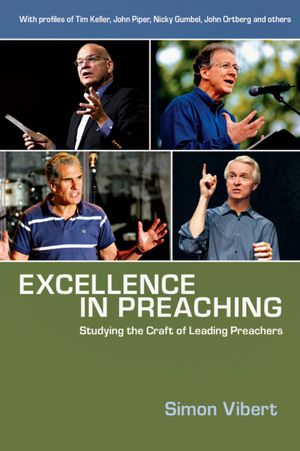 Excellence in Preaching: Studying the Craft of Leading Preachers Simon Vibert (IVP) $16.00 Let’s face it. Many pastors are frankly not that good at communication. They aren’t that inspiring as preachers. And many homiletics books—and we have dozens and dozens of them here at the shop—just aren’t able to teach how to be more interesting in the pulpit. There have been other books like this, and this one looks great. It is a survey of some of the best evangelical preachers (in the U.S. and England) holding up something they do really well, and ways in which more ordinary preachers can learn that attribute, skill or notion. I like that it uses the language of craft, which indicates that there is stuff that can be learned, but it isn’t merely a technique or simple skill. I like most of the preachers the author studies, and the things he draws from them are presently clearly. It does not say that you should copy them, of course, but only that you can learn from their techniques and passions and strengths. The author is vice principal and director of the School of Preaching at Wycliffe Hall, Oxford University. He has taught preaching (through John Stott’s global ministry) to preachers all over the world. Vibert’s study of twelve strengths from these twelve preachers just might help you improve in your communication style, which surely won’t hurt. The preachers VIbert studies includes Tim Keller, John Piper, John Ortberg, Nicky Gumble, Vaughn Roberts, J. John. All are men, all are evangelicals. Oh, and one chapter on Jesus. Marshall Shelly writes, “Vibert identifies elements that are transferable from these marquee pulpiteers to the rest of us. Excellence in Preaching gives us ‘ears to hear’ what we wouldn’t have heard otherwise.” Interesting.
Excellence in Preaching: Studying the Craft of Leading Preachers Simon Vibert (IVP) $16.00 Let’s face it. Many pastors are frankly not that good at communication. They aren’t that inspiring as preachers. And many homiletics books—and we have dozens and dozens of them here at the shop—just aren’t able to teach how to be more interesting in the pulpit. There have been other books like this, and this one looks great. It is a survey of some of the best evangelical preachers (in the U.S. and England) holding up something they do really well, and ways in which more ordinary preachers can learn that attribute, skill or notion. I like that it uses the language of craft, which indicates that there is stuff that can be learned, but it isn’t merely a technique or simple skill. I like most of the preachers the author studies, and the things he draws from them are presently clearly. It does not say that you should copy them, of course, but only that you can learn from their techniques and passions and strengths. The author is vice principal and director of the School of Preaching at Wycliffe Hall, Oxford University. He has taught preaching (through John Stott’s global ministry) to preachers all over the world. Vibert’s study of twelve strengths from these twelve preachers just might help you improve in your communication style, which surely won’t hurt. The preachers VIbert studies includes Tim Keller, John Piper, John Ortberg, Nicky Gumble, Vaughn Roberts, J. John. All are men, all are evangelicals. Oh, and one chapter on Jesus. Marshall Shelly writes, “Vibert identifies elements that are transferable from these marquee pulpiteers to the rest of us. Excellence in Preaching gives us ‘ears to hear’ what we wouldn’t have heard otherwise.” Interesting.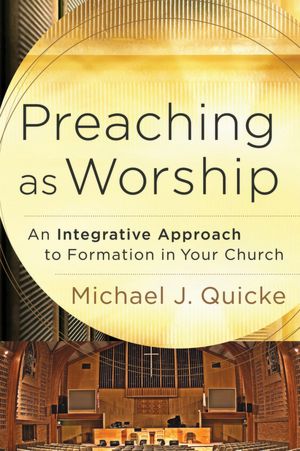 Preaching as Worship: An Integrative Approach to Formation in Your Church Michael J. Quicke (Baker) $17.99 Do you know his book 360 Degree Preaching? It’s good. This newer one is a fascinating, thorough study of how to move your church from “small-picture to big picture worship.” I love this “big picture” image… Part of this must include reconsidering and perhaps understanding afresh the role of the sermon within the broader work of the people’s worship of the Triune God. As Bryan Chapell of Covenant Theological Seminary puts it, “Quicke’s winsome and insightful exploration of preaching as an intregal component and reflection of Trinitarian worship is a welcome contribution to thoughtful literature on both preaching and worship. For too long, one has been viewed as simply a prelude or culmination of the other. Quicke helps us understand how worship and preaching function organically….” Very well put —how can we see preachomg as worship, and the sermon as an integrated aspect of the full worship service? Important stuff.
Preaching as Worship: An Integrative Approach to Formation in Your Church Michael J. Quicke (Baker) $17.99 Do you know his book 360 Degree Preaching? It’s good. This newer one is a fascinating, thorough study of how to move your church from “small-picture to big picture worship.” I love this “big picture” image… Part of this must include reconsidering and perhaps understanding afresh the role of the sermon within the broader work of the people’s worship of the Triune God. As Bryan Chapell of Covenant Theological Seminary puts it, “Quicke’s winsome and insightful exploration of preaching as an intregal component and reflection of Trinitarian worship is a welcome contribution to thoughtful literature on both preaching and worship. For too long, one has been viewed as simply a prelude or culmination of the other. Quicke helps us understand how worship and preaching function organically….” Very well put —how can we see preachomg as worship, and the sermon as an integrated aspect of the full worship service? Important stuff. Religion: The End of Church and the Birth of a New Spiritual Awakening (HarperOne; $24.95)
Religion: The End of Church and the Birth of a New Spiritual Awakening (HarperOne; $24.95) For those interested of the working group on fresh expressions, a group chaired by our plenary speaker Bishop Graham Cray, you should know that he edited a book all about this (a book we sold out of at the conference) called Mission Shaped Church (Seabury; $20.00) It is part of a series, actually, but this first is the one that describes the Fresh Expressions movement within the Church of England and it is recommended especially for more mainline denominations. Cray is a wonderful man and, incidentally, ran the famous
For those interested of the working group on fresh expressions, a group chaired by our plenary speaker Bishop Graham Cray, you should know that he edited a book all about this (a book we sold out of at the conference) called Mission Shaped Church (Seabury; $20.00) It is part of a series, actually, but this first is the one that describes the Fresh Expressions movement within the Church of England and it is recommended especially for more mainline denominations. Cray is a wonderful man and, incidentally, ran the famous  We are taking pre-orders, by the way, for a forthcoming book by Bishop Cray, enticingly called
We are taking pre-orders, by the way, for a forthcoming book by Bishop Cray, enticingly called  Francis Beckwith, Chris
Francis Beckwith, Chris Breaking Through
Breaking Through What a delight it was to
What a delight it was to own
own In my book announcement time I was
In my book announcement time I was McNeal’s latest book,
McNeal’s latest book, The Shaping of Things to
The Shaping of Things to Exiles: Living Missionally in a Post-Christian Culture
Exiles: Living Missionally in a Post-Christian Culture The Forgotten Ways: Reactivating the Missional Church
The Forgotten Ways: Reactivating the Missional Church Missional: Joining God in the
Missional: Joining God in the Missional Map-Making: Skills
Missional Map-Making: Skills Church in the Present
Church in the Present Remixing the Church:
Remixing the Church: Howard Synder’s Community of the King (revised and expanded) (IVP; $18.00) and often say it is my favorite book on the nature of the church. Also a favorite is a more recent book by Tim Chester—I sometimes called it “gospel centered church”—titled Total Church: A Radical Reshaping Around Gospel and Community (Crossway; $15.99. ) I do think it is important to revisit this regularly and this new one by Gay is good.
Howard Synder’s Community of the King (revised and expanded) (IVP; $18.00) and often say it is my favorite book on the nature of the church. Also a favorite is a more recent book by Tim Chester—I sometimes called it “gospel centered church”—titled Total Church: A Radical Reshaping Around Gospel and Community (Crossway; $15.99. ) I do think it is important to revisit this regularly and this new one by Gay is good. Worship, Worldview, and Christian Formation by James K.A. Smith (Baker Academic; $21.99), a book I wish I would have sold at Fresh Expressions since it is about how we need thick and rich liturgies and other “ecclesial practices” to counter the shaping influences of the secular litanies that so inform the habits of our hearts. If we are going to offer fresh expressions by doing edgy little church plants and forming house churches or communities of discipleship, what is it about those communities that will truly transform us? A great love for Jesus and desire to serve Him well a radically transformative body does not make, I’m afraid.
Worship, Worldview, and Christian Formation by James K.A. Smith (Baker Academic; $21.99), a book I wish I would have sold at Fresh Expressions since it is about how we need thick and rich liturgies and other “ecclesial practices” to counter the shaping influences of the secular litanies that so inform the habits of our hearts. If we are going to offer fresh expressions by doing edgy little church plants and forming house churches or communities of discipleship, what is it about those communities that will truly transform us? A great love for Jesus and desire to serve Him well a radically transformative body does not make, I’m afraid. Letters to a Future
Letters to a Future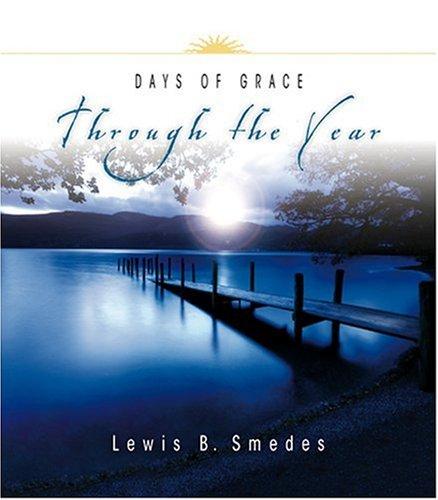 The free one we are sending is called Days of Grace Through the Year by Lewis B. Smedes (IVP) Our friend Jeff Crosby did a great job combing through Smedes’ extensive body of work and selecting excerpts of the very best pages, with the very best lines, to remind you of God’s great grace, and the beauty of fine writing, and the goodness of a theologian who could talk to ordinary folks with such extraordinary kindness. (Books & Culture editor John Wilson has a great foreword noting Smedes’ direct approach, his lack of unctuousness, and his various voices.) We have always loved Lew Smedes whether talking about forgiveness or finding hope in troublesome times or writing about sex or shame or social justice.
The free one we are sending is called Days of Grace Through the Year by Lewis B. Smedes (IVP) Our friend Jeff Crosby did a great job combing through Smedes’ extensive body of work and selecting excerpts of the very best pages, with the very best lines, to remind you of God’s great grace, and the beauty of fine writing, and the goodness of a theologian who could talk to ordinary folks with such extraordinary kindness. (Books & Culture editor John Wilson has a great foreword noting Smedes’ direct approach, his lack of unctuousness, and his various voices.) We have always loved Lew Smedes whether talking about forgiveness or finding hope in troublesome times or writing about sex or shame or social justice. 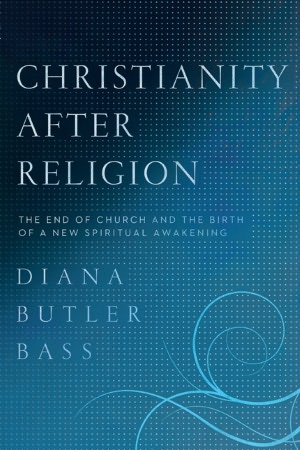 Christianity After Religion: The End of Church and the Birth of a New Spiritual Awakening Diana Butler Bass (HarperOne) $25.99 I was doing a “book show and tell talk” last week with a group of gathered mainline clergy and told them that this will both be the most talked about religious book of 2012 and perhaps the most deserving. I have a half a dozen reasons why I think this is important, even if agreeing with it all isn’t one of them. You know that we commend reading widely, learning from anyone who has something helpful to teach, enjoying the great gifts of good thinkers, writers, and cultural critiques. Diana is all of this and more. She knows mainline churches well, she understands and has some sympathies for some evangelical folks. She has been in rural churches, poor inner city parishes, charismatic congregations, churches big and small. She draws endorsements from high-jinxing radical activists like Shane Claiborne and from gentle Quakers like Parker Palmer. I am not alone in predicting the popularity of this important book as Phyllis Tickle herself, the god-mother of religious book reviewing, says “It is one blockbuster of an analysis that is also a delight to read.” Brian McLaren says “Of Bass’s many excellent books, this is the most substantive, provocative, and inspiring yet…It leads to a powerful finale of sage guidance for the future.”
Christianity After Religion: The End of Church and the Birth of a New Spiritual Awakening Diana Butler Bass (HarperOne) $25.99 I was doing a “book show and tell talk” last week with a group of gathered mainline clergy and told them that this will both be the most talked about religious book of 2012 and perhaps the most deserving. I have a half a dozen reasons why I think this is important, even if agreeing with it all isn’t one of them. You know that we commend reading widely, learning from anyone who has something helpful to teach, enjoying the great gifts of good thinkers, writers, and cultural critiques. Diana is all of this and more. She knows mainline churches well, she understands and has some sympathies for some evangelical folks. She has been in rural churches, poor inner city parishes, charismatic congregations, churches big and small. She draws endorsements from high-jinxing radical activists like Shane Claiborne and from gentle Quakers like Parker Palmer. I am not alone in predicting the popularity of this important book as Phyllis Tickle herself, the god-mother of religious book reviewing, says “It is one blockbuster of an analysis that is also a delight to read.” Brian McLaren says “Of Bass’s many excellent books, this is the most substantive, provocative, and inspiring yet…It leads to a powerful finale of sage guidance for the future.”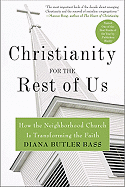 mature worship (Christianity for the Rest of Us: How the Neighborhood Church is Transforming the Faith [HarperOne; $14.99] is the best summary of all that, and I hope you have it. It is one of the defining religious books about congregational life of our time.) That book camped out on a big thesis: mega churches and conservative religion, while they get more press, are not the only sorts of Christian faith expression and not the only sorts of congregational life that is present in early 21st century North American culture. Let’s hear it for the little guys, the liberal churches that are vibrant, the mainline folks with their Henri Nouwen study groups and their dogged work in soup kitchens and their interesting willingness to be inclusive of gays and lesbians, their hospitality and social service. Somebody said that she was, in telling of innovative and robust UCC churches in New England and United Methodist churches down south and Presbyterian congregations in the heartland, nearly describing “emergent churches without the body piercings and tattoos.” That’s a good line, but it isn’t quite true. Christianity for the Rest of Us celebrated pretty normal, ordinary churches, those trying hard to live faithfully, despite declining numbers, often rigid denominational structures, and local communities that are in flux. Since most of us, as a matter of fact, aren’t in healthy, growing, large, conservative churches, she gave “the rest of us” a good pat on the back and a shot in the arm by telling us a bit about ourselves, our history and our future.
mature worship (Christianity for the Rest of Us: How the Neighborhood Church is Transforming the Faith [HarperOne; $14.99] is the best summary of all that, and I hope you have it. It is one of the defining religious books about congregational life of our time.) That book camped out on a big thesis: mega churches and conservative religion, while they get more press, are not the only sorts of Christian faith expression and not the only sorts of congregational life that is present in early 21st century North American culture. Let’s hear it for the little guys, the liberal churches that are vibrant, the mainline folks with their Henri Nouwen study groups and their dogged work in soup kitchens and their interesting willingness to be inclusive of gays and lesbians, their hospitality and social service. Somebody said that she was, in telling of innovative and robust UCC churches in New England and United Methodist churches down south and Presbyterian congregations in the heartland, nearly describing “emergent churches without the body piercings and tattoos.” That’s a good line, but it isn’t quite true. Christianity for the Rest of Us celebrated pretty normal, ordinary churches, those trying hard to live faithfully, despite declining numbers, often rigid denominational structures, and local communities that are in flux. Since most of us, as a matter of fact, aren’t in healthy, growing, large, conservative churches, she gave “the rest of us” a good pat on the back and a shot in the arm by telling us a bit about ourselves, our history and our future.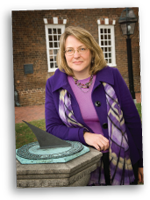 institutional hierarchies are healthy, crises upon crisis has worn down many churches, no denomination or religious group’s numbers are even holding steady. When the Southern Baptists declare it a “decade of evangelism” she has said, “you know we’re in trouble.” Christianity After Religion is asking one of the biggest questions to be asked nowadays: what should Christian churches and disciples of Jesus do in this era when so many are “spiritual but not religious?”
institutional hierarchies are healthy, crises upon crisis has worn down many churches, no denomination or religious group’s numbers are even holding steady. When the Southern Baptists declare it a “decade of evangelism” she has said, “you know we’re in trouble.” Christianity After Religion is asking one of the biggest questions to be asked nowadays: what should Christian churches and disciples of Jesus do in this era when so many are “spiritual but not religious?”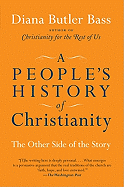 delightful, provocative study: how we think about God and God’s work in the world, that is, our worship and our discipleship, our attentiveness to God and relationship to neighbor, is decisively shaped by our metaphors about God. Do you recall how that book ended, the part she said is unfinished, being written, the stream that is flowing into the 21st century? Well, this is her provisional answer to what that might look like. Read any of her books, and find somebody with whom to talk about them. You are going to want to talk about them. You are going to want to underline stuff. And, I hope, you are going to put some big ‘ol question marks next to some parts. What does she mean by that? And what do we do with this? My, my, it is going to be a good year, pondering, debating, and struggling to take seriously what our sister has written in this important new book. Is it true that (as Bill McKibben puts it) “experience, connection, and service are replacing theology as keys to the next Great Awakening”? And if it is so, is that a good thing? Read Christianity After Religion, think and pray and talk.
delightful, provocative study: how we think about God and God’s work in the world, that is, our worship and our discipleship, our attentiveness to God and relationship to neighbor, is decisively shaped by our metaphors about God. Do you recall how that book ended, the part she said is unfinished, being written, the stream that is flowing into the 21st century? Well, this is her provisional answer to what that might look like. Read any of her books, and find somebody with whom to talk about them. You are going to want to talk about them. You are going to want to underline stuff. And, I hope, you are going to put some big ‘ol question marks next to some parts. What does she mean by that? And what do we do with this? My, my, it is going to be a good year, pondering, debating, and struggling to take seriously what our sister has written in this important new book. Is it true that (as Bill McKibben puts it) “experience, connection, and service are replacing theology as keys to the next Great Awakening”? And if it is so, is that a good thing? Read Christianity After Religion, think and pray and talk. Viral: How Social Networking is Poised to Ignite Revival Leonard Sweet (Waterbook) $14.99 I enjoy telling the story how I interviewed Sweet years ago for an adult ed class I was doing on his work. His thick and world-shaking Soul Tsunami had just come out, and I both read it, and listened to the tremendous audio book. It was the most fascinating bit of cultural analysis I had read in years, and I was very intrigued. I was irked at his too-quick dismissal of linear thinking, and he was bemused by my Reformed and bookish ways. Let’s just say I quoted Postman’s Amusing Ourselves to Death to him maybe just a few too many times, kept asking how we can not just “ride the waves” of what history is disclosing but shape, or at least help direct those waves. We talked about
Viral: How Social Networking is Poised to Ignite Revival Leonard Sweet (Waterbook) $14.99 I enjoy telling the story how I interviewed Sweet years ago for an adult ed class I was doing on his work. His thick and world-shaking Soul Tsunami had just come out, and I both read it, and listened to the tremendous audio book. It was the most fascinating bit of cultural analysis I had read in years, and I was very intrigued. I was irked at his too-quick dismissal of linear thinking, and he was bemused by my Reformed and bookish ways. Let’s just say I quoted Postman’s Amusing Ourselves to Death to him maybe just a few too many times, kept asking how we can not just “ride the waves” of what history is disclosing but shape, or at least help direct those waves. We talked about 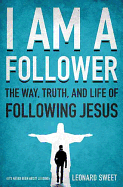 characters that stand for certain types of people you should have in your life, and that you should be for someone, just came out in paperback.) He has several on leadership (the latest, I Am a Follower), on being a disciple of Jesus, one on the Holy Spirit, on the church, on evangelism, and a good one about what congregations can learn from Starbucks — although, before you get in a hissy fit about that, he doesn’t say we should simply emulate business models for parish life. Not at all. He has even co-written a novel, sort of am futuristic, theological Indiana Jones adventure romp. All energetically written, creative and commendable in one way or another.
characters that stand for certain types of people you should have in your life, and that you should be for someone, just came out in paperback.) He has several on leadership (the latest, I Am a Follower), on being a disciple of Jesus, one on the Holy Spirit, on the church, on evangelism, and a good one about what congregations can learn from Starbucks — although, before you get in a hissy fit about that, he doesn’t say we should simply emulate business models for parish life. Not at all. He has even co-written a novel, sort of am futuristic, theological Indiana Jones adventure romp. All energetically written, creative and commendable in one way or another.  to the digital culture–and others of us are immigrants to the brave new world of screens and ubiquitous intra-nets. This is not our native tongue, and we are learning it as a second language. So he isn’t just geeking out with other hipster techies, nor is he just waxing positive on the cool possibilities of using media in church. No, he is ruminating pretty seriously on how those of us who aren’t native to the 21st century TGIF culture can learn to inhabit and do ministry in this new google world, where, as somebody put it, referring to our expertise by a finger stroke through google, “the smartest guy in the room is actually in the room.” Or, similarly, he is inviting those who are digital natives to use their skills and sensibilities for God’s glory.
to the digital culture–and others of us are immigrants to the brave new world of screens and ubiquitous intra-nets. This is not our native tongue, and we are learning it as a second language. So he isn’t just geeking out with other hipster techies, nor is he just waxing positive on the cool possibilities of using media in church. No, he is ruminating pretty seriously on how those of us who aren’t native to the 21st century TGIF culture can learn to inhabit and do ministry in this new google world, where, as somebody put it, referring to our expertise by a finger stroke through google, “the smartest guy in the room is actually in the room.” Or, similarly, he is inviting those who are digital natives to use their skills and sensibilities for God’s glory.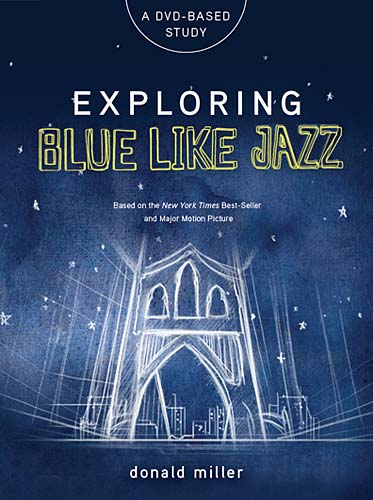 Exploring Blue Like Jazz: A DVD-Based Study and Resource Guide Dixon Inser with Donald Miller (Nelson) Book only $14.99 // Combo pack book + DVD $29.99 I guess anybody reading BookNotes will know of Blue Like Jazz, Miller’s fabulously written, bohemian story of his faith journey — abandoned by his father, enfolded into a fundamentalist faith, ending up wondering about it all as he hangs out at one of the smartest and most secular campuses in the Pacific NW. Blue Like Jazz has become nearly iconic for a new breed of post-evangelical kids—enjoyed by cynical Gen Xers and their parents, given out to millennials on campus by Cru, used in all manner of coffee shop book groups. To say it is a huge seller and well-loved is an understatement. And now–after a good number of years, a “little project that could” and a book written about it all–it has been turned into a cutting edge, movie, produced by the inestimable Steve Taylor. It premiered at South by SouthWest which, I think it is fair to say, is not too shabby and a good indication that the indie film might be taken seriously.
Exploring Blue Like Jazz: A DVD-Based Study and Resource Guide Dixon Inser with Donald Miller (Nelson) Book only $14.99 // Combo pack book + DVD $29.99 I guess anybody reading BookNotes will know of Blue Like Jazz, Miller’s fabulously written, bohemian story of his faith journey — abandoned by his father, enfolded into a fundamentalist faith, ending up wondering about it all as he hangs out at one of the smartest and most secular campuses in the Pacific NW. Blue Like Jazz has become nearly iconic for a new breed of post-evangelical kids—enjoyed by cynical Gen Xers and their parents, given out to millennials on campus by Cru, used in all manner of coffee shop book groups. To say it is a huge seller and well-loved is an understatement. And now–after a good number of years, a “little project that could” and a book written about it all–it has been turned into a cutting edge, movie, produced by the inestimable Steve Taylor. It premiered at South by SouthWest which, I think it is fair to say, is not too shabby and a good indication that the indie film might be taken seriously. 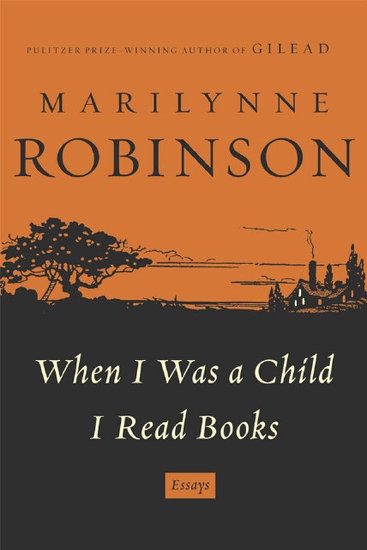 When I Was a Child I Read Books: Essays Marilynne Robinson (FSG) $24.00 One of the most prestigious publishers has given us a new collection of essays by one of our great woman of letters, the Pulitzer Prize winning novelist, essays, and Calvin scholar, Marilynne Robinson. You may have read Housekeeping, an early book happily reissued after Gilead made her famous, or you may have been taken with the slow, good story of Home (which, a reviewer in The Nation, opined, “rendered relationship with a new depth”) which picked up where Gilead left off. Robinson’s essays were released in the serious collections The Death of Adam and, just out in paperback, Absence of Mind. Now, she has a new collection of ten or so pieces, on topics as diverse as cosmology and Moses. She has one on the flamboyant evangelical abolitionist, Oberlin, and one entitled “Imagination and Community” which reminds me of a topic of Wendell Berry. The feisty scholar and novelist Doris Lessing says of her essays that they are “a useful antidote to the increasingly crude and slogan-loving culture we inhabit.” She is serious, dense at times, and a public intellectual well worth reading.
When I Was a Child I Read Books: Essays Marilynne Robinson (FSG) $24.00 One of the most prestigious publishers has given us a new collection of essays by one of our great woman of letters, the Pulitzer Prize winning novelist, essays, and Calvin scholar, Marilynne Robinson. You may have read Housekeeping, an early book happily reissued after Gilead made her famous, or you may have been taken with the slow, good story of Home (which, a reviewer in The Nation, opined, “rendered relationship with a new depth”) which picked up where Gilead left off. Robinson’s essays were released in the serious collections The Death of Adam and, just out in paperback, Absence of Mind. Now, she has a new collection of ten or so pieces, on topics as diverse as cosmology and Moses. She has one on the flamboyant evangelical abolitionist, Oberlin, and one entitled “Imagination and Community” which reminds me of a topic of Wendell Berry. The feisty scholar and novelist Doris Lessing says of her essays that they are “a useful antidote to the increasingly crude and slogan-loving culture we inhabit.” She is serious, dense at times, and a public intellectual well worth reading. 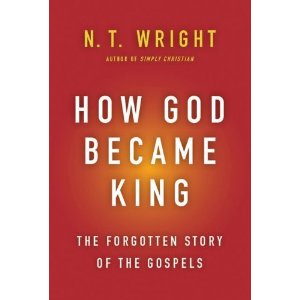 How God Became King: The Forgotten Story of the Gospels N.T. Wright (HarperOne) $24.95 Yes, you heard it here before: we’ll be calling N.T. “Tom” in no time after he visits here in Dallastown on May 12th when he comes to the bookstore for an autograph session and reception. We hope folks bring books for him to sign and I hope lots of people buy this one. One advance reviewer said this may be his best yet. It is a study of the Synoptic Gospels, and a study of exactly how the theme of the rule of God seen in the Lordship of Christ came to be expressed so convincingly. And how we missed it. This is vintage stuff, important for our project here, as we try to sell books relating faith and life through the lens of the Kingdom of God. Brand new today, this book is sure to be highly regarded, and will, some say, be soon known as a classic. Long live the King! And may the tribe of those who are passionate about the reign of Jesus, rediscovered by a careful reading of the Holy Scriptures, increase! Start here: buy this book, get some folks together and imagine what to do with it all. And come by and report it to the author if you are able, Saturday May 12th at 1:00 pm. Of course we’ll have all his books on sale then, but why wait? Order today.
How God Became King: The Forgotten Story of the Gospels N.T. Wright (HarperOne) $24.95 Yes, you heard it here before: we’ll be calling N.T. “Tom” in no time after he visits here in Dallastown on May 12th when he comes to the bookstore for an autograph session and reception. We hope folks bring books for him to sign and I hope lots of people buy this one. One advance reviewer said this may be his best yet. It is a study of the Synoptic Gospels, and a study of exactly how the theme of the rule of God seen in the Lordship of Christ came to be expressed so convincingly. And how we missed it. This is vintage stuff, important for our project here, as we try to sell books relating faith and life through the lens of the Kingdom of God. Brand new today, this book is sure to be highly regarded, and will, some say, be soon known as a classic. Long live the King! And may the tribe of those who are passionate about the reign of Jesus, rediscovered by a careful reading of the Holy Scriptures, increase! Start here: buy this book, get some folks together and imagine what to do with it all. And come by and report it to the author if you are able, Saturday May 12th at 1:00 pm. Of course we’ll have all his books on sale then, but why wait? Order today.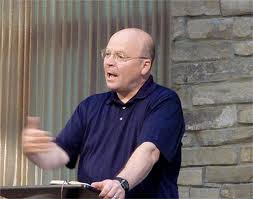 , faculty, and others seeking a more intellectual approach to faith here in Central PA (including, for instance, in his work with the
, faculty, and others seeking a more intellectual approach to faith here in Central PA (including, for instance, in his work with the 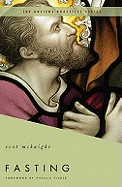 The Ancient Practices Series: Fasting (Nelson) $12.99 This is the time of the church year to try out this practice if it isn’t a common part of your quiet experiences before the Lord. You hopefully recall how I’ve raved about the seven books in this great series (on practices such as keeping sabbath, generous tithing, the sacred meal, the liturgical calendar, fixed hour prayer, going on pilgrimage, and such.) With a great foreword by Phyllis Tickle (the general editor of the series) and blurbs from the likes of Ruth Haley Barton, this book is solid, helpful, interesting, Biblical, calm and profoundly in touch with that for which we most yearn.” Highly recommended.
The Ancient Practices Series: Fasting (Nelson) $12.99 This is the time of the church year to try out this practice if it isn’t a common part of your quiet experiences before the Lord. You hopefully recall how I’ve raved about the seven books in this great series (on practices such as keeping sabbath, generous tithing, the sacred meal, the liturgical calendar, fixed hour prayer, going on pilgrimage, and such.) With a great foreword by Phyllis Tickle (the general editor of the series) and blurbs from the likes of Ruth Haley Barton, this book is solid, helpful, interesting, Biblical, calm and profoundly in touch with that for which we most yearn.” Highly recommended.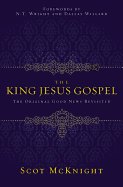 King Jesus Gospel: The Original Good News Revisited (Zondervan) $19.99 With a foreword by N.T. Wright and another by Dallas Willard you may get the idea that this hardback is about the fuller understanding of the Kingdom of God and how we can be formed in the ways of Jesus. This is the best simple clear overview of this central gospel theme that we know of. Wright notes “The revolution Scot is proposing is massive and we all urgently need to allow this deeply biblical vision of the gospel to challenge the less-than-completely biblical visions we have cherished for too long.” Right on! Pro Rege!
King Jesus Gospel: The Original Good News Revisited (Zondervan) $19.99 With a foreword by N.T. Wright and another by Dallas Willard you may get the idea that this hardback is about the fuller understanding of the Kingdom of God and how we can be formed in the ways of Jesus. This is the best simple clear overview of this central gospel theme that we know of. Wright notes “The revolution Scot is proposing is massive and we all urgently need to allow this deeply biblical vision of the gospel to challenge the less-than-completely biblical visions we have cherished for too long.” Right on! Pro Rege!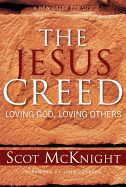 The Jesus Creed: Loving God, Loving Others (Paraclete Press) $16.99 In over 300 pages, (although in a nice type font) McKnight explores and drives home this central re-telling of the shema, Jesus’ call to love God by loving others. Sounds simple, eh? Well, the power of religiosity hasn’t been dismantled yet, and this profoundly Jewish creed could transform our lives, if we saw it as a new rule of life. Fabulous. A foreword by John Ortberg reminds us how very usable this is, how our lives will be enhanced if you learn from Scot the ways of Jesus. (There is, by the way, but not on sale, a devotional guide, using this book for 40 days, and a teen version.)
The Jesus Creed: Loving God, Loving Others (Paraclete Press) $16.99 In over 300 pages, (although in a nice type font) McKnight explores and drives home this central re-telling of the shema, Jesus’ call to love God by loving others. Sounds simple, eh? Well, the power of religiosity hasn’t been dismantled yet, and this profoundly Jewish creed could transform our lives, if we saw it as a new rule of life. Fabulous. A foreword by John Ortberg reminds us how very usable this is, how our lives will be enhanced if you learn from Scot the ways of Jesus. (There is, by the way, but not on sale, a devotional guide, using this book for 40 days, and a teen version.) 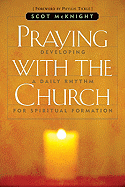 Praying with the Church: Following Jesus Daily, Hourly, Today Foreword by Phyllis Tickle (Paraclete Press) $15.95 A few years ago Phyllis Tickle helped launch a renewed interest in the monastic practice of “fixed hour” prayers, or “praying the hours” when she published her important three-volume prayer book. When a Baptist scholar like McKnight writes about this use of such prayers, and does so so eloquently and helpfully, you know somethings going on. Paraclete does very nice books, and although this may be lesser known than some of his others, it is surely one of his enduring classics. Funny, some of us who do not follow this practice of doing the hours, still are deeply blessed by reading about the custom, and how it enriches those who do.
Praying with the Church: Following Jesus Daily, Hourly, Today Foreword by Phyllis Tickle (Paraclete Press) $15.95 A few years ago Phyllis Tickle helped launch a renewed interest in the monastic practice of “fixed hour” prayers, or “praying the hours” when she published her important three-volume prayer book. When a Baptist scholar like McKnight writes about this use of such prayers, and does so so eloquently and helpfully, you know somethings going on. Paraclete does very nice books, and although this may be lesser known than some of his others, it is surely one of his enduring classics. Funny, some of us who do not follow this practice of doing the hours, still are deeply blessed by reading about the custom, and how it enriches those who do.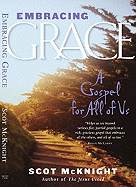 Embracing Grace: A Gospel for All of Us (Paraclete Press) $16.95 I love this endorsement by Ross Wagner, a New Testament prof at Princeton Theological Seminary: “With grace, humility, and wit, Scot McKnight offers a compelling vision of the breath-taking scope of the gospel — that in Jesus Christ, God is at work restoring broken people to full humanity in loving community with God, and with one another, for the salvation of all creation. This is a message to be pondered, savored, embraced, and embodied.” Grace is more than “punishment avoidance” and if we recipients of God’s grace, we should be people who live graciously; as he puts it, we aren’t just saved by grace, but we can “live transformed by
Embracing Grace: A Gospel for All of Us (Paraclete Press) $16.95 I love this endorsement by Ross Wagner, a New Testament prof at Princeton Theological Seminary: “With grace, humility, and wit, Scot McKnight offers a compelling vision of the breath-taking scope of the gospel — that in Jesus Christ, God is at work restoring broken people to full humanity in loving community with God, and with one another, for the salvation of all creation. This is a message to be pondered, savored, embraced, and embodied.” Grace is more than “punishment avoidance” and if we recipients of God’s grace, we should be people who live graciously; as he puts it, we aren’t just saved by grace, but we can “live transformed by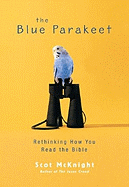 The Blue Parakeet: Rethinking How You Read the Bible (Zondervan) $14.99 I promise you this: you will find something in this book that will ping you, something you’ll love, something you’ll want to reconsider, something that will make you chuckle, and most likely something that will annoy the daylights out of you. He is honest before the problems of weird texts, he is honest about how we sometimes get bored reading the same old passages, and he is honest that neither liberals nor conservatives do the interpretation thing very well. He shows us the big story and he uses upbeat and helpful illustrations. If I were teaching a class on Bible interpretation, this would be one of the many books I’d make mandatory reading.
The Blue Parakeet: Rethinking How You Read the Bible (Zondervan) $14.99 I promise you this: you will find something in this book that will ping you, something you’ll love, something you’ll want to reconsider, something that will make you chuckle, and most likely something that will annoy the daylights out of you. He is honest before the problems of weird texts, he is honest about how we sometimes get bored reading the same old passages, and he is honest that neither liberals nor conservatives do the interpretation thing very well. He shows us the big story and he uses upbeat and helpful illustrations. If I were teaching a class on Bible interpretation, this would be one of the many books I’d make mandatory reading.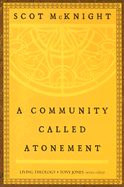 A Community Called Atonement (Abingdon) $18.00 Tony Jones is a writer, about spiritual disciplines and the history and ethos of the emergent movement. On behalf of Emergent Village he edited a book series called “Living Theology” and they are all excellent. This was the first, a survey—and I don’t mean a dry survey, but a truly vibrant overview—of the standard theories of the atonement, and how we need to honor the differing emphases and the diverse faith communities that seem most drawn to each. That is, we must be honest before the Biblical texts, respect the diversity of theological insights down through the ages, and learn to do “living theology” in our communities. An excellent book about theology, about the cross, and about the role of dogma within faith traditions and the church at large. Hans Boersma (J.I. Packer Professor at Regent College) says it is “gutsy, orthodox, creative…” Might I suggest it suitable as we draw near to Holy Week?
A Community Called Atonement (Abingdon) $18.00 Tony Jones is a writer, about spiritual disciplines and the history and ethos of the emergent movement. On behalf of Emergent Village he edited a book series called “Living Theology” and they are all excellent. This was the first, a survey—and I don’t mean a dry survey, but a truly vibrant overview—of the standard theories of the atonement, and how we need to honor the differing emphases and the diverse faith communities that seem most drawn to each. That is, we must be honest before the Biblical texts, respect the diversity of theological insights down through the ages, and learn to do “living theology” in our communities. An excellent book about theology, about the cross, and about the role of dogma within faith traditions and the church at large. Hans Boersma (J.I. Packer Professor at Regent College) says it is “gutsy, orthodox, creative…” Might I suggest it suitable as we draw near to Holy Week?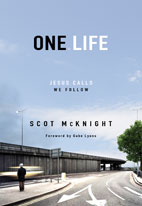 One.Life Jesus Calls, We Follow (Zondervan) $14.99 You know, we’ve pitched this book to ya before—I celebrated the slick design of the cover, I named it a book of the year, and we showed it as a Jubilee special, this multi-faceted, rich recovery of the notions of discipleship, vocation, calling, Kingdom vision and missional service. Gabe Lyons of the Q Ideas wrote the forward, using the passionate rhetoric he and his generation are known for. This book doesn’t answer all your questions, he says, but he promises that you will see the Jesus life more clearer. This is a really useful book, a great resource, and masterful guide to living in the Kingdom that is now and not yet. As Margaret Feinberg writes on the back, Each of us is only given one life, and after reading this book, you’ll desire to live it with abandon to God.”
One.Life Jesus Calls, We Follow (Zondervan) $14.99 You know, we’ve pitched this book to ya before—I celebrated the slick design of the cover, I named it a book of the year, and we showed it as a Jubilee special, this multi-faceted, rich recovery of the notions of discipleship, vocation, calling, Kingdom vision and missional service. Gabe Lyons of the Q Ideas wrote the forward, using the passionate rhetoric he and his generation are known for. This book doesn’t answer all your questions, he says, but he promises that you will see the Jesus life more clearer. This is a really useful book, a great resource, and masterful guide to living in the Kingdom that is now and not yet. As Margaret Feinberg writes on the back, Each of us is only given one life, and after reading this book, you’ll desire to live it with abandon to God.”